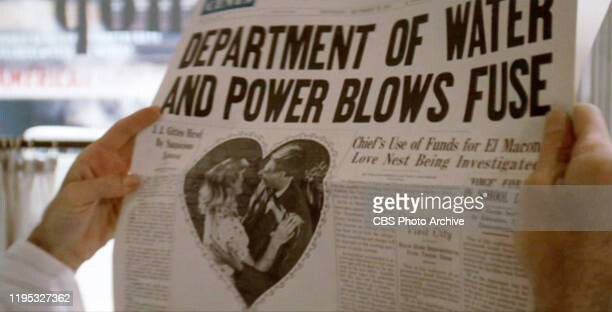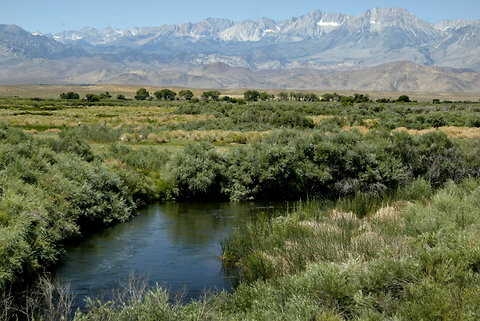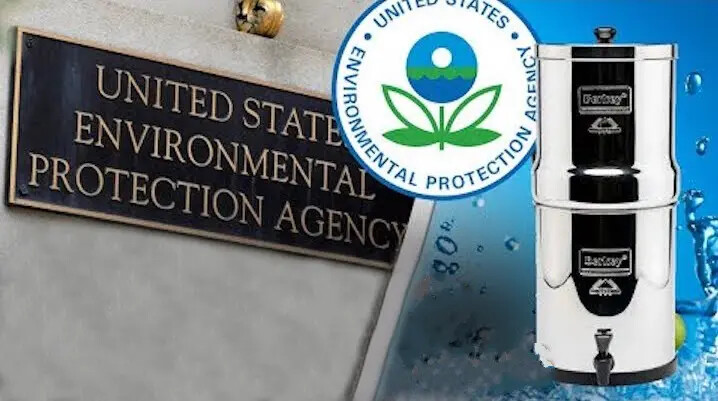Britain dries up: Millions face threat of household water rationing as drought is declared while shops clampdown on panic-buying with limits on bottled water and nation bakes in 95F heat
- Parched South and East declared in a state of drought putting pressure on water companies to fix leaks
- Some of England experienced the driest July since records began as reservoirs fell to lowest level in 30 years
- Temperatures will hit 95F (35C) today and are forecasted to rise to 99F (37C) over the weekend with warnings
Swathes of England are officially in drought today amid scorching temperatures and hardly any rain since June as supermarkets began rationing bottled water to prevent panic buying and millions more households edged closer to a hosepipe ban.
Residents in London, the South West, Southern and Central England and East of England have been move into drought status where they are being urged to be frugal with water because of the driest summer in 50 years with no rain and 35C [95f] forecast today, 37C [98f] forecast tomorrow and 35C [95f] on Sunday.
As Britain sweltered in temperatures hotter than parts of the Caribbean, an Aldi store in London put up posters limiting customers to between three and five bottles of drinking water each amid panic buying.
Today's official drought declaration does not automatically trigger legal limits on water use in the eight areas of England named today.
But it will pile more pressure on more water companies to ban customers from using hosepipes and sprinklers. Washing cars with buckets of water from the tap could also soon be outlawed.
And if no rain arrives in the coming weeks, millions could also be banned from cleaning any vehicles, buildings and windows. It could also mean water rationing for households.
Britons have already been told to avoid baths and have short showers, put less water in the kettle, only do fully loads of laundry in washing machines and put on the dishwasher a maximum of once a day.
But the Government has insisted that there will be no repeat of household taps going dry like in 1976, where millions had to use standpipes in the street.
'All water companies have reassured us that essential supplies are still safe,' Water Minister Steve Double said, add: 'We are better prepared than ever before for periods of dry weather, but we will continue to closely monitor the situation, including impacts on farmers and the environment, and take further action as needed'.
It is the first drought declared in the UK since 2018 – although that one was rapidly brought to an end by heavy rain - but despite the threat of torrential downpours and thunderstorms on Monday, much of southern England is unlikely to see significant rain until September.
The move will also put pressure on water companies to do more to conserve supplies after a number of major leaks in recent weeks wasting millions of gallons of water. The heat and dry conditions have also taken their toll on agriculture, including grains, fruit and vegetables.
The National Farmers Union also said 'tinder dry' standing crops and parched grass posed a huge risk of fires spreading as Britons were urged not to have barbecues in case it starts blazes amid warnings that fire brigades are already too stretched to cope.
Hosepipe bans have already been announced for around 17million people – and another 15million could soon join them. Parts of southern England had the driest July since records began, and reservoir levels have fallen to their lowest levels in last 30 years.
Today, Yorkshire Water became the fifth company in England and Wales to announce a hosepipe ban for its five million customers.
Southern Water, South East Water, Welsh Water and Thames Water have all announced hosepipe bans either now or in the coming weeks. South West Water and Severn Trent have all indicated they will also bring in restrictions. Together, they would cover more than 32 million people.
Temperatures are expected to hit 95F (35C) today - making the country hotter than parts of the Caribbean and threatening crops like potatoes, apples, hops, broccoli and sprouts.
The conditions, which have almost completely deprived some areas of rainfall all summer, have prompted the National Drought Group to move parts of the South West, parts of southern and central England, and the East of England into official drought status.
The change could lead to more measures such as hosepipe bans, however, the Environment Agency has reassured the public that essential water supplies are safe.
The NDG is made up of representatives from the Department for Environment Food and Rural Affairs, water companies, the Environment Agency, the National Farmers' Union, Natural England, Consumer Council for Water, water services regulator Ofwat, Water UK and the Drinking Water Inspectorate, as well as the Angling Trust and the Rivers Trust.
Water Minister Steve Double said action was already being taken by the Government, the Environment Agency and others to manage the impacts.
'All water companies have reassured us that essential supplies are still safe, and we have made it clear it is their duty to maintain those supplies', he said.
'We are better prepared than ever before for periods of dry weather, but we will continue to closely monitor the situation, including impacts on farmers and the environment, and take further action as needed.'
The most recent EA data showed rainfall totals for August have ranged from 12% of the long-term average in north east England to 0% in southeast and south west England.
Meanwhile river flow data revealed almost 90% of measuring sites were showing below normal readings, with 29% classed as 'exceptionally low'.
It comes after the driest July on record for some areas and the driest first half of the year since 1976.
Four water companies, Welsh Water, Southern Water, Thames Water, and South East Water have all imposed hosepipe bans, while Yorkshire Water has announced a ban will start on August 26.
he heat and dry conditions have also taken their toll on agriculture.
According to the NFU, crops such as sugar beet and maize are showing signs of stress from a lack of rain, while crops relying on irrigation, such as field vegetables and potatoes, are also facing problems.
NFU deputy president Tom Bradshaw said the situation was 'hugely challenging' for farmers who were facing running out of irrigation water and having to use winter feed for animals because of a lack of grass.
The NFU also said 'tinder dry' standing crops and parched grass posed a huge risk of fires spreading.
Mark Hardingham, chair of the National Fire Chiefs Council, said: 'While we are likely to see more wildfires due to the current conditions, it is impossible to say whether this will be more than when the country experienced 40-degree temperatures.
'The bigger risk at the moment is a combination of temperature and wind speed, which will contribute to fire spread and makes incidents harder to manage and extinguish.'
However, he added brigades were 'well prepared and have plans in place' to respond.
Panic buyers have returned - and this time they're after bottles of water in preparation for the impending drought.
Now, Brits are returning to the pre-Covid angst of empty shelves and are trying to stock up on water before it's too late.
One user took to Twitter and wrote: 'I'm going to rush out and buy 6 months stock of bottled water now!'
However, evidently some people are already furnishing their supply, with another user saying he saw one person at the supermarket with two trolleys full of bottled water.
Yorkshire Water will bring in a hosepipe ban from August 26, with its director of water, Neil Dewis, saying parts of the county had seen the lowest rainfall since records began more than 130 years ago.
Under the restrictions, customers are banned from using a hosepipe to water their gardens, clean their vehicles, fill their swimming pools or clean their homes.
However, they are still permitted to complete those activities with tap water from a bucket or watering can, or using water that is not sourced from taps.
Businesses will only be allowed to use a hosepipe if it is directly related to a commercial purpose.
Parts of southern England have seen the driest July since records began, and reservoir levels have fallen to their lowest levels in 30 years. Sources last night said they expect the drought declaration to be a 'formality'.
A four-day amber warning for extreme heat from the Met Office is in place for much of England and Wales until Sunday as temperatures are forecasted to rise to 99F (37C) over the weekend with warnings of health impacts and disruption to travel.
There are also fears rain after the dry weather will cause flash floods, the Met Office said, with warnings set for northern parts of the UK next week. This has already prompted farmers like TV star Jeremy Clarkson to harvest their crops early.
'It may be the wrong type of rain because it falls very fast and very hard,' Paul Davies, the Met Office chief meteorologist, told the BBC.
'When it comes against the hard ground then the water flows very fast, taking debris and causing flash flooding, whereas other areas may see very little at all.'
A drought would be the first declared in the UK since 2018 – although that one was rapidly brought to an end by heavy rain.
The move will be announced after a meeting of the National Drought Group today, led by the Environment Agency and including water firms and groups such as the National Farmers' Union and the Angling Trust.
While an official declaration of drought will not trigger any specific action by water companies, it creates a 'sense of urgency' for them, according to Government sources. An Environment Agency spokesman said firms were under no obligation to take action.
There has been criticism that water firms in England and Wales let 681 million gallons of water leak from their pipes every day, equivalent to 1,245 full Olympic swimming pools.
Tory leadership candidate Rishi Sunak yesterday vowed to crack down on leaking water companies if he becomes prime minister, saying 'nothing is off the table'. But aides in Liz Truss's camp said this amounted to a policy U-turn as he had previously supported hosepipe bans.
The UK Centre for Ecology and Hydrology said it would require 'exceptional' rainfall over the next one to three months to replenish water stocks. Satellite images show huge areas of England looking yellow and parched under the extreme dry weather.
According to the Sun, some supermarket shelves were stripped dry from water bottles.
Hosepipe bans also in turn have an effect on farmers, which could threaten crops.
Jerry Knox, a professor of agricultural water management at Cranfield University, told the Guardian: 'We are starting to see real issues for crops such as potatoes. We will see reduced yields and particularly reduced quality.'
'Potatoes are set to become more expensive while farmers are already abandoning plans to grow brassicas like cabbages,' Professor Jerry Knox of Cranfield University told the Times. 'The autumn and winter will be critical to to return to normal conditions.'
Professor Liz Bentley, chief executive of the Royal Meteorological Society, said: 'Drought will not disappear in a matter of days — it's going to take a long period of sustained rainfall.'
The UK Health Security Agency has put a heat health alert in place. Temperatures hit 34.2C (93.6F) at Wiggonholt, West Sussex, yesterday.
Forecaster Craig Snell said: 'It's going to be an incredibly hot day, and very sunny across the board, with temperatures slightly higher than what we saw on Thursday.'
There is also a heat health alert in place from the UK Health Security Agency, with experts advising people to look out for those who are older or with existing health conditions, as well as young children.
The ongoing dry conditions, combined with last month's record-breaking heatwave, have depleted rivers, reservoirs and aquifers and dried up soils, hitting agriculture, water supplies and wildlife and raising the risk of wildfires.
Four water companies in England and Wales have already brought in hosepipe bans or have signalled their intention to do so, while the Wildlife Trusts have called for an England-wide hosepipe ban to protect nature and rivers.
Some water companies have failed to meet their own targets for cutting household leaks and domestic use, with many blaming the coronavirus pandemic as more people have been at home.
Ofwat, the water regulator. said in a statement: 'Progress has been made in the past few years but there is much further to go, which is why we are pushing companies to reduce leakage, fix their environmental performance and become more financially resilient while keeping bills affordable and helping customers reduce their consumption.
'Where we find that companies have fallen short, we will act - over the last five years, for example, we have imposed penalties and payments of over £250 million.'
It comes after temperatures reached 34.2C at Wiggonholt, West Sussex, on Thursday afternoon, while many areas in southern England and Wales hit the low 30s.
Fires broke out in different areas, including London, Essex, Gloucestershire, Surrey and Cheshire, yesterday.
The London Fire Brigade were called at 11:36am yesterday to a fire at Hollow Ponds on Whipps Cross Road in Leytonstone, where around 75 square metres of grass and shrub land were alight. Two fire engines and around 10 firefighters attended the scene and the inferno was under control around an hour later. The cause of the blaze is still being investigated.
National Highways have also urged Britons to be 'prepared' with bottles of water before setting out amid more train strikes scheduled this weekend.
Met Office meteorologist Marco Petagna said: 'The risk is very high across much of central, southern and eastern England. Going into Friday and the weekend, it starts to increase further, going into the highest category of exceptional risk.'
Heatwave thresholds - which are met at different temperatures in different parts of the country - are likely to be hit in much of the UK.
Temperatures reached 34.2C at Wiggonholt, West Sussex, on Thursday afternoon, and climbed above 33C in a number of places from Shropshire to the south east of England.
Met Office chief meteorologist Andy Page also said: 'Persistent high pressure over the UK means temperatures have been rising day-on-day through this week and it is important people plan for the heat.
'Temperatures are expected to peak at 35C on Friday and possibly 36C over the weekend.
'We will also see increasingly warm nights, with temperatures expected not to drop below the low 20s for some places in the south.'
He said temperatures would drop early next week, with heavy showers and thunderstorms likely in some areas - but it was 'impossible to say yet exactly where and when they will occur'.
Britain has been told to brace for a sweltering heatwave this week as a Level 3 Heat Health Alert also came into effect Tuesday and has been extended until Saturday - with little rain expected to help relieve the threat of drought which has prompted hosepipe bans and fire warnings.
Mark Hardingham, the chairman of the National Fire Chiefs Council (NFCC) said that he 'can't remember a summer like this' in his entire 32-year career in the fire service.
(Continued ... )




